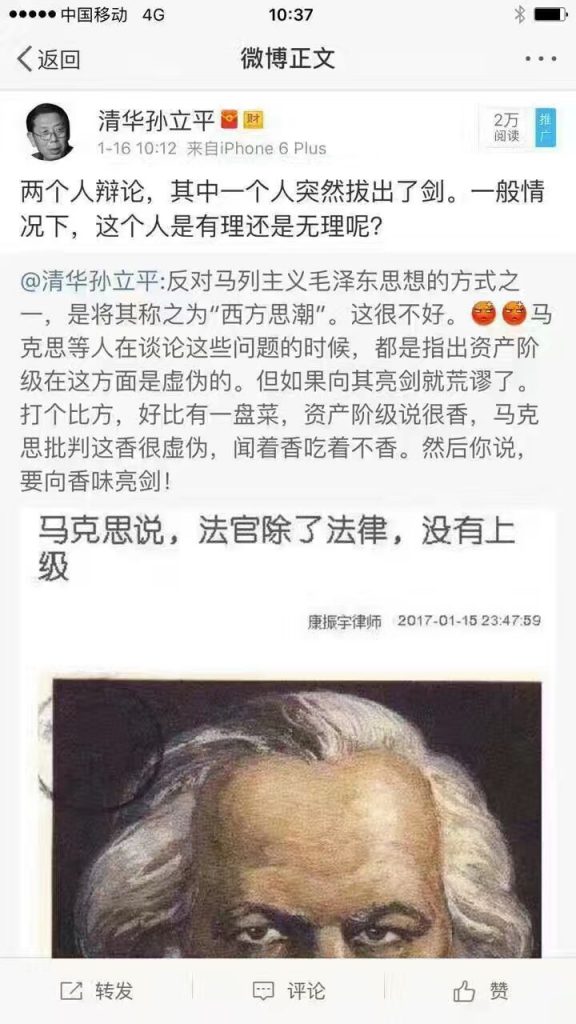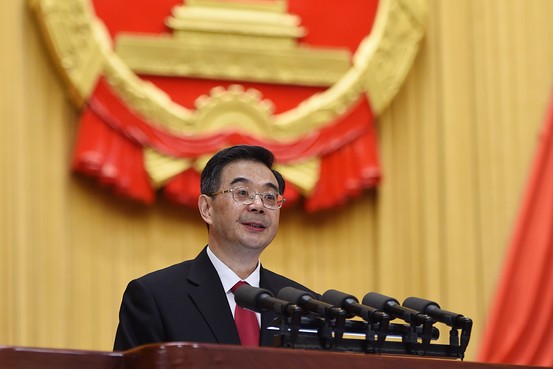State media last weekend reported that Supreme People’s Court Chief Justice Zhou Qiang warned the high court to resist ideologies that pose a threat to the Party, calling on it to: “resolutely oppose the influence of Western ‘constitutional democracy,’ ‘separation of powers,’ ‘judicial independence’ and other harmful ideas. Make your stance clear, dare to use your force […]” Reuters’ Nicholas Heath, Lusha Zhang, and Christian Shepherd report on the comments from China’s top judge and the online debate that they sparked:
Authorities in Beijing say China requires a different kind of legal system from Western models, one in keeping with a system of “socialism with Chinese characteristics”, where reforms strengthen, rather than weaken, Party leadership.
People’s Courts at all levels must disregard erroneous Western notions, including constitutional democracy and separation of powers, Chief Justice Zhou Qiang told a meeting of the Supreme People’s Court on Saturday, the [China News Service] agency said.
[…] Zhou’s comments sparked much critical public discussion, with online participants citing comments in a 2012 interview by Jiang Ping, a professor at the China University of Political Science and Law, that only judicial independence could allow China to ensure a “just judiciary”.
However, searches for the article brought up no results on Weibo, China’s Twitter-like equivalent, by early afternoon on Monday. […] [Source]
Zhou’s warning comes on the heels of a decision early this month from the Central Commission for Discipline Inspection that a new mechanism to supervise the conduct of Party officials cannot exist independently of the CCP. When questioned on the possibility of an independent system at a media briefing on new CCDI rules, a CCDI official cited its incompatibility with Chinese socialism.
In February 2015, after the Xi Jinping administration launched an ongoing campaign against “Western values,” Zhou Qiang similarly urged Party officials to dismiss “erroneous Western thought,” such as the notions of judicial independence and the separation of powers.
CDT Chinese editors compiled some of the initial Weibo comments that followed news of Chief Justice Zhou’s recent comment. Several have been translated below:
LiJiajiaAudrey (@李佳佳Audrey): If we don’t have judicial independence, how are we going to prevent the executive powers from intervening with the judiciary? If judicial independence is a good thing that can bring equality and justice to a nation, then why does its place of origin matter?
Jingxunian (@经许年): For anything that puts their authoritarian rule at risk, the leaders just call it “Western” and “anti-China.” Then their crusade against it becomes justified. This is the degradation of leaders’ wisdom. Their tricks have been exhausted.
CezhanRendingXuefeng (@策展人丁雪峰): This is a mystical country: the military opposes nationalization; judges oppose judicial independence; media opposes oversight by press; government officials oppose disclosure of finances; schools oppose freedom of thought; people oppose the real democracy of “one man one vote.” Since when did judicial independence become a “false,” “Western” ideal? Even the rogue state of North Korea wouldn’t dare to say something as facist as this. I suddenly understand why Europe, America, Japan, South Korea and basically the whole world are scared of communism. So horrible.
XiBa (@夕爸): Are you guys trying to teach the advantages of judicial independence to someone who holds a BA from Southwest University of Political Science and Law, and a PhD in Law from Tsinghua University? He knows more than anybody. Then why did he say this? You know the reason.
XiwangYuXinnian (@希望与信念): Wait, did Marxism come from China?
HeWeifang (@贺卫方): 【Absurd】No matter what country we are in, if there’s no independent judiciary, extrajudicial intervention will be a common scene. The court won’t be able to adjudicate cases and disputes strictly according to the law, therefore the people won’t be able to feel equality and justice in the judicial process. This will eventually lead to rampant injustice and rebellion. People wished for judicial independence even in ancient China, as is evident in the story of Bao Zheng. Labeling judicial independence as a “Western ideal” and wanting to get rid of it is an atrocity against our country and our people. This is turning back the wheel of history. [Chinese]
 Tsinghua sociology professor Sun Liping responded to Zhou’s choice of words–as the phrase Zhou used, “use your force,” literally translates as “draw your sword” (亮剑)–writing on Weibo: “If two people are in a debate, and one of them suddenly draws his sword, under normal circumstances, has this person won or lost?” Sun’s post has since been deleted.
Tsinghua sociology professor Sun Liping responded to Zhou’s choice of words–as the phrase Zhou used, “use your force,” literally translates as “draw your sword” (亮剑)–writing on Weibo: “If two people are in a debate, and one of them suddenly draws his sword, under normal circumstances, has this person won or lost?” Sun’s post has since been deleted.
State-affiliated tabloid Global Times coverage summarizes one of the responses posted by the official Weibo of the Supreme People’s Court after the online debate was shut down:
One of five posts by the SPC on Sunday on its Sina Weibo account said, “when Zhou’s speech was released, those who said that ‘if there is no judicial independence, there is no justice’ misrepresented his speech.”
“Many comments on ‘judicial independence’ aim to import the West’s judicial concept and undermine China’s political system. But Zhou only meant to reiterate the spirit of China’s Constitution,” the post said.
It explained that the CPC leadership, political power and system, enshrined in the Constitution, are at the core of the Constitution. Though chosen by the National People’s Congress, there is no clash with the independent powers of judicial organs. [Source]
Chief Justice Zhou’s comments come on the heels of a recent episode in which two elected Hong Kong lawmakers were barred from office for refusing to pledge allegiance to Beijing, a move that led some officials to fear for the semi-autonomous territory’s judicial independence.
[This post has been updated to include a translation of Zhou’s original comments as well as Sun Liping’s Weibo comment.]








